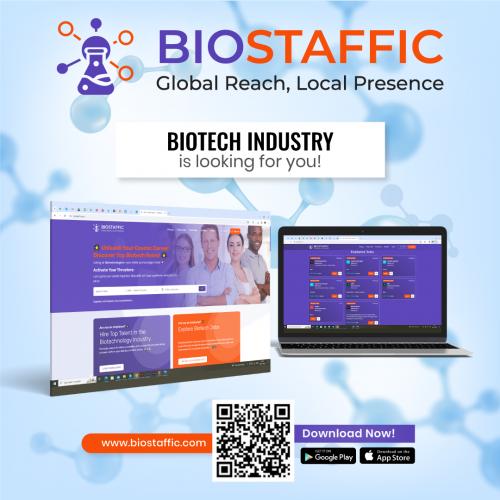Biostaffic: Catalysing your job hunt journey in Biotechnology

With the surging population, developments in technology are increasing at a faster pace to ease humans' lives. Recent achievements in the field of Biotechnology are the Human Genome Project, First IVF Baby, CRISPR, Genetic Fingerprinting, 23andMe, Dolly, Engineered Organ, Beyond Meat Burger, Golden Rice, and Kymriah.
With the rapid development in the field of biotechnology, there are plenty of jobs in biotechnology, and it is important to find the right organization that fits your qualifications and the potential candidate for the organization. Biostaffic is the catalyst for finding jobs early without wasting much time on job seekers and organizations.
In this context, we will discuss how prepare for a Career in the Biotech Industry:
1. Build an educational foundation.
Broadbelt says the first key to a successful biotech career is a solid educational foundation rooted in science-related coursework. Advanced programs, such as a Master of Science in Biotechnology, can give you a chance to explore the many avenues you can take in your career—something he considers critical.
2. Stay open-minded.
In a field like biotechnology, Broadbelt says: "Keep the blinders off." When choosing your path, he says it's important to look at the wealth of potential roles you can play in the industry and not limit your options based on your first few experiences in the field.
Since there are so many options, it can be tough to find a good fit right away. While many prefer working for a pharmaceutical giant—"the Pfizers and Mercks of the world"— others prefer start-up cultures where they'll be expected to wear many hats.
3. Hone your soft skills.
While it's important to be detail-oriented at the bench, Broadbelt says it's equally important to hone your soft skills. In today's biotechnology market, scientific expertise is only one part of the hiring equation.
When you get to the interview, the hiring manager is going to want to talk about your soft skills, he says. They want to know they are hiring the whole package. It's not just about "how well you can pipette," but how you can communicate and articulate your ideas to others within the business.
4. Build your professional network.
Establishing a robust professional network is crucial to career success. In fact, studies show that 85 percent of all jobs are filled through networking. So, although it may seem difficult to find the time, make it a priority to build meaningful connections with those around you, including colleagues, supervisors, advisors, professors, and industry professionals.
5. Keep learning and adapting.
One of the biggest challenges biotechnology professionals face, he says, is being prepared for the constant change that occurs in the industry.
The good news is, however, because the only constant is change, there's likely to be a new product or team that will quickly appear in its place, he says. One way to be prepared for this dynamic industry is to never stop learning. Broadbelt suggests upskilling by earning additional certificates in the discipline, attending conferences, and utilizing your network.
Post Your Ad Here
Comments